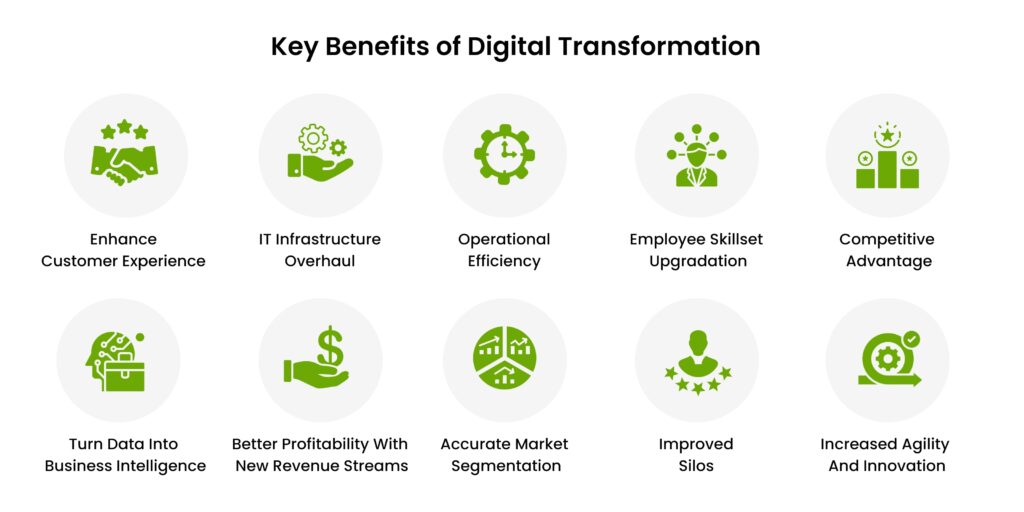Being on the verge of ending the year 2022 and the beginning of a new year – 2023, it’s essential to look back at the most discussed topic of the business landscape. Yes, you guessed it right, we are talking about none other than Digital Transformation.
In 2022, we witnessed renowned brands and businesses embracing market trends, turning towards new-age business models and automation, and doubling their investments in digital transformation to enhance productivity, flexibility, scalability, and business impact.
In fact, a recent report by Markets and Markets elaborates on the accelerating pace of global spending in digital technologies to skyrocket and reach USD 1247.5 billion by 2026.
The key reasons behind increased digital transformation investments, businesses were able to proffer unprecedented digital experiences to end users, better process and analyze data, improve decision-making, and increase customer engagement, thus ultimately increasing business revenue.
Moving ahead, to explore more about digital transformation, we thought of diving deep into the intricacies of digital transformation, the challenges leaders face, trends, and myths, in addition to exploring what exactly the coming year has in store for businesses undergoing digital transformation or planning to partner with business transformation consultants to strategize their business transformation.
Now without further ado, let’s get started!
What is Digital Transformation (DX)?
Let’s go by definition, according to Salesforce. Digital transformation is using digital technologies to create new or modify existing business processes, culture, and customer experiences to meet changing business and market requirements, i.e., the reimagining of business in the digital age is digital transformation.
However, as one of the world’s top Digital Transformation consulting firms and the finest mobile app development solution providers, our take on digital transformation is similar yet slightly different.
At the core, digital transformation is way beyond just embracing technology to improve your business process. Instead, Digital Transformation is a multi-step journey to derive positive business shift that involves analytical decision-making, lateral thinking, hiring the right experts, identifying the bottlenecks in business processes, and enabling constant innovation to not only achieve long term business envisions but also to improve the efficiency and scalability of the business on a day to day basis.
Also, Read – WHAT IS DIGITAL TRANSFORMATION?
Let’s quickly look at the key benefits of employing digital transformation.

Also, Read – Why Businesses Should Invest in Digital Transformation
Why is Digital Transformation Essential For Business Growth?
Digital transformation needs no introduction. Being a part of an ever-evolving era, we all have a fair idea about how essential Digital transformation is for business growth. Right from helping organizations embrace the latest technology trends and expanding to new markets to improving operational efficiency. Businesses partnered with business transformation consultants have gained a competitive edge and experienced top-line growth by digitally transforming their business operations and processes.
Further, the top 3 reasons why digital transformation is essential for businesses are:
Remain Competitive
One of the key reasons why businesses are exponentially turning towards digital transformation is to be consistently aligned with the highly competitive business environment.
It may seem overwhelming to transform the traditional business model, but when your competitors start leveraging the technology, it becomes imperative to remain competitive and not fall behind the competition.
By implementing digital transformation strategies, businesses can introduce new tools and technologies in their business processes and operations and enhance the current pace of business, productivity, feasibility, and scalability, while aiming to offer an unparalleled digital experience to their end users to get ahead of the competition.
Reach New Markets
Another critical reason businesses actively adopt digital technologies is their ability to expand their businesses reach. By partnering with business transformation consultants, leaders can better understand where their business needs digitization, what part of their processes can be automated or improved, and so on.
Proactively digitizing operations and planning mobile solutions to ease the entire customer journey with the brand can help businesses improve their customer experience, build a loyal customer base, help tap into new global markets, and ultimately boost revenues and gain customers faster than ever.
Reduce Costs And Increase Efficiency
Finally, the third key reason businesses transform digitally is improved operational efficiency and reduced costs. Often entrepreneurs who invest in digital transformation strategy consulting reap numerous benefits of employing digital transformation in their business.
Especially by streamlining the operations, automating mundane manual tasks, and utilizing enterprise talent to make a difference in the organization, leaders can significantly enhance productivity, grow their operations, and add more value.
Employing digital tools and technologies in business improves how enterprises operate and deliver customer value and also empowers the leaders to accommodate the ever-evolving demands of the consumers as the needs and expectations of your clients change.
What are the Most Common Digital Transformation Challenges that Organizations Face?
As read above, we know that Digital transformation empowers the organization to reimagine how your business is run by employing new digital processes and tools. But accompanying the advancements, organizations face challenges during their digital transformation journey.
As an enterprise leader, as you embark on the business transformation journey, you need to understand that it’s not necessary that you will face all or any of the challenges, as a well-thought strategy can help you have a seamless business transformation.
To better understand the challenges, here’s a rundown of organizations’ top challenges while digitally transforming their business processes.
1. Siloed decision-making
One of the most common and daunting challenges that organizations face is related to their internal silos. As organizational silos pose obstacles in building a digital transformation strategy or bringing in a new business model, they negatively impact the entire organization’s business transformation journey.
Organizational Silos, in the most simpler terms, lead to a lack of unified vision and thus disorients the internal structure. And then every individual is focused on catering to their own indispensable goals instead of aiming at turning business envisions into reality, which ultimately restricts innovation, productivity, and better use of efficiencies.
Therefore, as leaders embark on the business transformation journey, ensure that you consider taking your team and your people along the journey. Without mentoring your team about what you want to do and achieve, your digital transformation journey will be just another incomplete project.
2. Legacy systems
The next challenge that organizations face is moving their legacy systems from analog to digital, as the most daunting challenge is moving out of comfort zones.
Often businesses hesitate to transform their legacy systems as they still continue to reap benefits from their legacy systems despite the absence of improved and effective robust tools.
But here, leaders must understand that today, business is all about proactively catering to the consumer’s needs. We live in an ever-evolving business era, and to remain competitive in this era of business disruption, organizations have to take a step forward, uplift themselves digitally and focus on customer experience and stay consistent while delivering business value, or else it won’t be long before you fall back from the competition.
So, make sure that you employ new tools and techniques; even if you don’t want to switch to new models, atleast improve them entirely and make them robust, flexible, and efficient enough to deliver the result your business needs to thrive in the competitive landscape.
3. Risk-averse organizational culture
Top businesses that are thriving in the marketplace are the ones that adapt to change rather than resisting the market shift. Being in the industry for over 12+ years now, we have seen numerous businesses resist change; from C-level executives to employees, there is a stiff resistance to change and adopting new ways of working or new technologies.
But they need to remember that resistance to change impedes business growth and innovation, which becomes another daunting challenge for leaders envisioning their business transformation journey. So, as you plan the digital transformation, ensure that your organizational culture is well-aligned with the ultimate goals and isn’t resistant to change.
4. Looming digital skill gap
As the hiring pool turns global and employees have begun preferring hybrid work cultures, the IT skill gap is another daunting challenge that leaders have to deal with. Employees at every level require basic technical know-how when paving the way for business transformation.
Not being equipped with technically sound employees leads to an insufficiency of skills that organizations require for a successful digital transformation. Therefore, before putting forward your steps towards business transformation, ensure that you align your resources or hire the right talent that could help you with a seamless transition.
5. Increased security risks
Organizations often rush their digital transformation efforts to get ahead of the competition and start implementing digital solutions without contemplating the security risks associated with them.
As technology and the business era evolve, so does the competence of cyber intruders. Thus when digitally transforming your business, the leader should ensure that to implement a secure IT infrastructure that isn’t vulnerable to increased cyber security risks.
To equip your business with a secure IT infrastructure, leaders could partner with one of the renowned devops consulting companies to assist in aligning your business needs and IT requirements.
Also, Read – THE ROLE OF CLOUD AND DEVOPS IN DIGITAL TRANSFORMATION
What are the Common Myths About Digital Transformation?
Myth 1: Digital Transformation is All About Adopting the Latest Technology
One of the most common myths of digital transformation is that people often consider the essence of digital transformation as introducing technology into the organization.
At the crux, digital transformation is more than just technology; rather is more about analyzing your business, figuring out where your business needs improvement, and then planning the right tools and techniques to solve the adamant business problem.
Now that we have read so much about what actually digital transformation is, its easier to debunk this myth by mere understanding that digital transformation is an entire cultural shift, wherein leaders have to take a collaborative approach, ensure that the team isn’t resistant to change, and you can pinpoint the business problem, and employ the right tools and techniques that help achieve business goals.
As one of the top digital transformation consulting firms in the world, a piece of advice that we wish to share with you is that before putting forward your first step towards digital transformation, ensure that you are well aligned with your business’s current status, and the goal where you want to be, and then align new models to improve, and trust us, everything else will fall into place.
Myth 2: Digital Transformation is a One-Time Fix
When the world was confined to their home during the Pandemic, most renowned brands quickly responded by proactively switching their working model to hybrid and turned towards platforms like Microsoft Teams, Slack, and Zoom.
Well, this shift was temporary but taught us an invaluable lesson: businesses that adapt to the ever-evolving circumstances thrive in the competitive landscape. Thus organizations who wish to embrace the digital disruption era should not consider digital transformation as a one-time activity.
Rather than being a part of a constantly evolving marketplace, leaders should understand that digital transformation is an ongoing process of innovation, improvement, and adaptation.
And those who will consider this as a one-time fix might excel somewhere but won’t be able to compete in the long run, and the competition will constantly be on the top of the digital disruption landscape and will be able to cater to the needs of the consumers. Thus leaving you way behind in the competition.
Myth 3: Digital Transformation is Not Linked to Business Metrics
This is one of the most common myths in the marketplace. In the business world, there’s no investment that cannot be measured.
Businesses undergoing digital transformation should always plan digital transformation initiatives based on their business’s current growth and the possible opportunities for improvement. Getting on the bandwagon of digital transformation just for the sake of competition won’t benefit the business.
Also, for those planning their digital transformation strategy, it is always advisable to reach out to expert business transformation consultants if you are overwhelmed with the entire concept of digital transformation. The top business transformation consultants could help you easily align and quantify metrics that can help you analyze the results of your digital initiatives.
However, the top 3 metrics that can help quantify your digital transformation efforts are:
- Monitoring ROI from your digital investments.
- Analyzing whether new technology and processes are driving employee productivity or not
- Whether your Customer effort score (CES), Customer Satisfaction (CSAT), and Net promoter score (NPS) are positive or negative.
What’s Next?
With all that we read, we hope you clearly understand what digital transformation is and what it entails for businesses.
As we begin a new year, we will witness more businesses turn towards digital transformation. Those aiming for business expansion, improved efficiency, and overall business transformation must be ready for new technologies to become dominant, stay on top of the market trends, stop being resistant to change, and start adapting and evolving as the competence and business grows.
In case you need assistance to align your business transformation initiatives, the best way is to partner with one of the top digital transformation consulting firms known for their proficient team of business transformation consultants with a proven track record of helping businesses undergo a successful transformation by embracing the best of technology and market trends.




